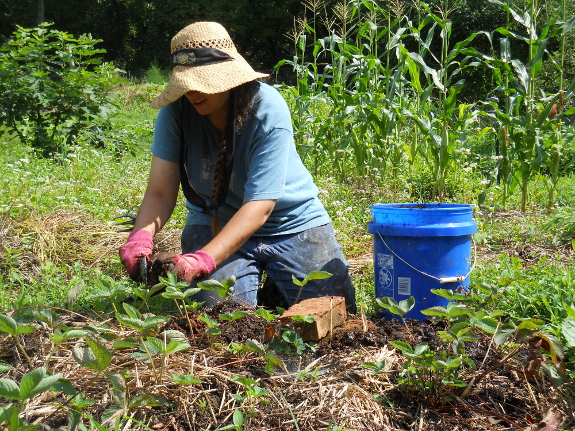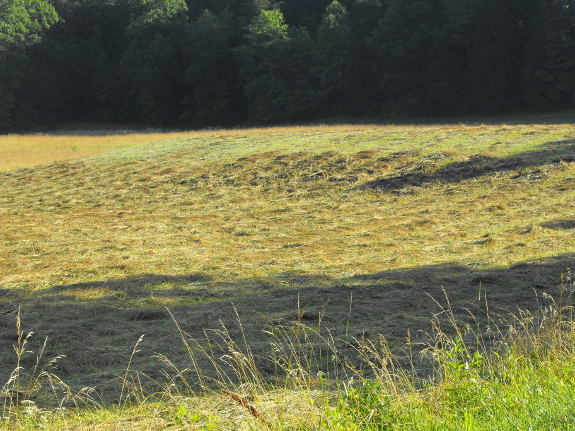
Is horse manure organic?

Some of the herbicides in the aminopyralid group can be long lasting and can survive the transit thru a horses GI tract. They're great for managing a horse pasture because they are long-lasting, but the resulting manure is supposed to be kept out of the compost heap, as the warning on the containers states. Some compost sold to gardeners has been know to contain these chemicals. I'd like to think they made it there inadvertently rather than thru motives of greed.

That's an excellent
question, and the answer will depend on how livestock are
kept near you. In our area, hay is a very low-impact crop
--- people simply let whatever's there grow up, mow it once,
twice, or thrice a year, and that's that. They do sometimes
spread chemical fertilizers on the ground to make up for the
nutrients they take away while haying, but I'm willing to put up
with the possible lack of micronutrients that might result once
the hay passes through a horse and ends up in my garden. I'd
be much more leery of the hay if it was raised in a different
manner, but I don't expect people in our economically depressed
region to have enough funding to improve their hayfields by
plowing and replanting any time soon.
While herbicide use on the pasture is slightly more likely in our
area, it also seems to be far from widespread. Most of the
surrounding pastures are what's known as "unimproved," meaning
that they're produced by mowing whatever's there repeatedly until
only grasses and low weeds remain. If our manure-producers
were using herbicides on their pastures, we'd likely know right
away since our crops would fail, then we'd find another source of
manure.

The larger problem
with horse manure is pharmaceuticals that might have been fed to
the horses, specifically dewormers. A couple of years ago,
there were a spate of articles about home gardeners who lost crops
due to using compost that was based on horse manure with dewormers
in it. This is always a gamble, although the longer you age
the manure between horse and garden, the lower your risk is.
I've never seen any issues in our own garden, so I suspect if the
relevant horse owners use dewormers, their use is minimal enough
that the chemicals break down quickly in our biologically-rich
soil.
Although not a
chemical issue, everyone will have to deal with the problem of
weed seeds in their horse manure. In a perfect world, we'd
compost the manure well enough to kill the seeds, but in this real
world, I just hand-pull and mulch, which deals with any weeds that
might otherwise pop up.
In the end, I'm not
an organic purist from a labeling standpoint --- I'm sure the
horse manure we use wouldn't fly if we wanted to jump through the
hoops to sell our produce as organic. We're more interested
in our own health and the quality of our soil than in the word
"organic," though, and the horse manure we use seems to be the
best option there, given our location.
Want more in-depth information? Browse through our books.
Or explore more posts by date or by subject.
About us: Anna Hess and Mark Hamilton spent over a decade living self-sufficiently in the mountains of Virginia before moving north to start over from scratch in the foothills of Ohio. They've experimented with permaculture, no-till gardening, trailersteading, home-based microbusinesses and much more, writing about their adventures in both blogs and books.
Want to be notified when new comments are posted on this page? Click on the RSS button after you add a comment to subscribe to the comment feed, or simply check the box beside "email replies to me" while writing your comment.

Thanks for posting some reading on this topic. Keeping my own horses, I definitely use horse manure in my own garden. And, not so long ago, I found myself in this very debate.
While the hay farmer I get my hay from does spray his fields, everyone else in driving distance does as well. I don't think there's any easy way to get around that problem. But, in the past few years, vets have modified their opinions on worming schedules. The over-the-counter wormers (that a decade ago we all used diligently every 6 weeks per the instructions on the package and general blessing of our vet) are now not-so-shockingly pretty much ineffective. Instead, nowadays, we are told to not administer without having a test done by the vet confirming worms are present. I'm not keen on having the vet out for every little thing so I am inclined to worm in the spring and fall as preventative, and then just keep an eye out.
This has been a real concern for me and my farm. I would love to use horse manure for my compost but cannot find a reliable source that knows for sure the quality of their hay. I have met a farmer who was almost put out of business by tainted manure. I also just last week met a nurseryman who lost a lot of stock using herbicide treated compost he bought to make his potting mix, and that came from a company with organic in its name.
I haven't tried this but I met a guy who uses horse manure from the same source to feed his worms (he is a red wiggler supplier). He says every time he gets a load he will take a bit and mix it with water for a while, then use that water on a plant to see what happens. Seems like this makes sense.
Horse manure does make excellent soil amendment and can transform even sandy loam into fertile humus in no time.
Anna's right about not worrying about residual chemicals in the manure if you're not trying to jump thru the artificial govt hoops.
Horse wormers are just not a problem: they are not absorbed from the gut if ingested. They don't harm plant life. The horse is given a few gms of chemical and it is then diluted in 50 - 100 lb of manure for the next day or two and spread hapharzardly over acres of pasture, usually only two times year.
Herbicides used on the pasture are used because they do not effect the animals eating the grass/hay. They won't hurt us either. Those long acting ones can make it into the manure in concentrations large enough to hurt vegetation. Avoid them, obviously.
While I am not a purist about organic labels, I have been burned on the manure front. We went to a friend's to use their well composted horse manure for the garden. We mixed a lot of it into the soil and the next spring planted tomatoes. The plants showed signs of clopyralid toxicity. The beds that had manure in them were not able to be planted with nightshades, legumes or the spinach family (brassicaes, cucurbits and alliums did fine though). It has taken 4 seasons to get those beds to a point where they can be used.
Now, before applying new manure to beds we do a bio-assay (instructions on the web, basically growing peas in the new manure mixed with soil) and a question is what kind of hay is the animal fed. If it is alfalfa, then clopyralid is not likely to be a problem (it would kill the alfalfa). If the animal eats oats, then there is a higher likelihood that it could be contaminated. Some stables also use lime to reduce flies, changing the pH. I think what it comes down to, as with anything, is try to know your source.